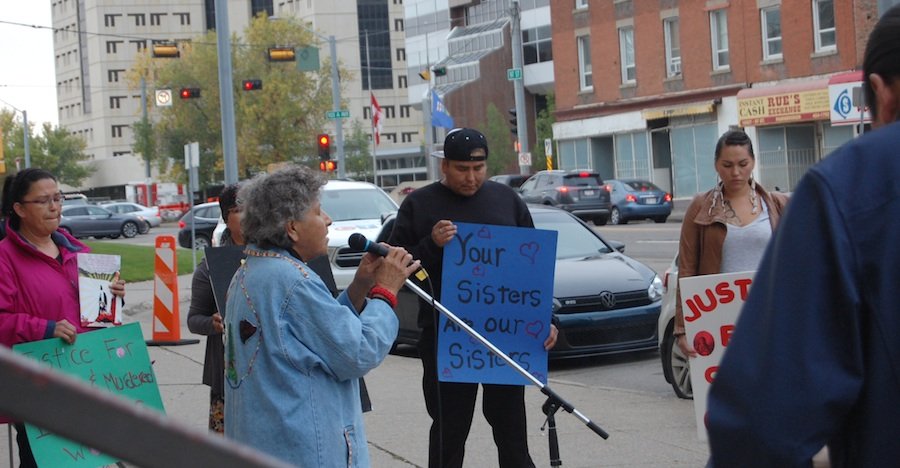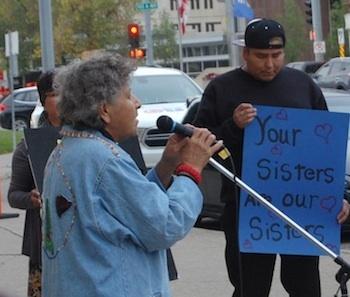Image Caption
By Shari Narine
Sweetgrass Contributing Editor
CALGARY
October 24, 2016.
As the province pushes for more judicial appointments by the federal government, Minister of Justice and Solicitor General Kathleen Ganley says she would like to see those appointments reflective of Alberta’s diversity.
“Certainly the position of this provincial government that we need to see the diversity of population represented in all aspects of government, including the bench. I certainly have an eye to that when I’m making appointments to the provincial court. I understand that the federal justice minister also has that high on her list of things that she considers important. So I mean I believe they will be looking at it but it’s difficult to say (as) ultimately that will be their decision,” said Ganley.
Ganley’s most recent appointment came on Sept. 28 when she appointed Ivan Modeste Laurie Ladouceur, a member of the Metis Nation of Alberta, to St. Paul, in the Edmonton region of the provincial court.
Last Thursday when Ganley was making the call for 10 new positions for the Court of Queen’s Bench and the Court of Appeal, federal Justice Minister Jody Wilson-Raybould announced five new judges to the province's Court of Queen's Bench and the promotion of two others to the Alberta Court of Appeal. While two of the five new judges are women, none of the five are Indigenous.
However, in total, Wilson-Raybould appointed or promoted 24 judges, two of whom self-identified as Indigenous and 14 of whom were women.
Wilson-Raybould also announced new measures to strengthen the role of judicial advisory committees in the judicial appointment process.
“I understand part of the reason they want to revamp their federal appointment process is to ensure that it’s transparent and reflective of the population,” said Ganley.
Wilson-Raybould announced that among the changes that would take place immediately, the JACs would be “reconstituted” to better represent Canada’s diversity.
Diversity on Alberta’s bench is imperative, says Kim Stanton, legal director for the Women’s Legal Education and Action Fund.
Stanton’s comment came in an interview with Sweetgrass late last month after she had been in Alberta presenting written briefs to the Court of Appeal on Cindy Gladue’s case and to the Canadian Judicial Committee discussing Justice Robin Camp’s future. In the Gladue case, an Edmonton jury acquitted Ontario truck driver Bradley Barton of second degree murder, accepting that rough sex led to the death of Gladue, an Indigenous woman and sex trade worker. In the incident of Camp, the Calgary judge came under fire for the comments he made both during the 2014 trial in Alberta Provincial Court in Calgary and in rendering his verdict -- which was later overturned -- as he acquitted Alexander Scott Wagar of sexually assaulting a young Indigenous woman.
“There is a great need for diversity on the bench,” said Stanton. “If you have a homogenous bench then you will not have credibility with the people in front of you at some point, because the people appearing in front of judges are much more diverse than the bench.”
Ganley’s push for more judges follows the Supreme Court of Canada’s ruling in R. v. Jordan this summer that the accused has the right to be tried within a reasonable time. The Supreme Court set 18 months for cases tried in provincial court and 30 months for cases in the superior court or cases tried in provincial court after a preliminary inquiry.
Ganley said in light of the Jordan decision, Alberta could not continue with a business-as-usual approach. She said cases would have to be prioritized to work through the existing backlog and to ensure serious, violent charges are dealt with and not dismissed. She said the focus would be on ensuring early case resolutions, which could mean dismissing or dropping charges, or diverting cases to be dealt with in other ways. She said Crown Prosecutors would review cases on an individual basis.
“Over the last 20 years, Alberta’s population has grown by 50 per cent and the previous federal government, as well as the previous provincial government, failed to address the growing strain. That’s going to have to change,” said Ganley. “Beyond current vacancies, Alberta needs more justices.”
Alberta passed an Order in Council on Oct. 19 creating an additional nine positions on the Court of Queen’s Bench and an additional position on the Court of Appeal. Following the federal appointments and the newly created positions by the province, there are 21 vacant positions in Alberta. All those positions have to be filled through appointments by the federal government.

Elder Elsie Paul led the prayer at a rally for Cindy Gladue, underscoring the need for diversity on the bench. (Photo: Shari Narine)

